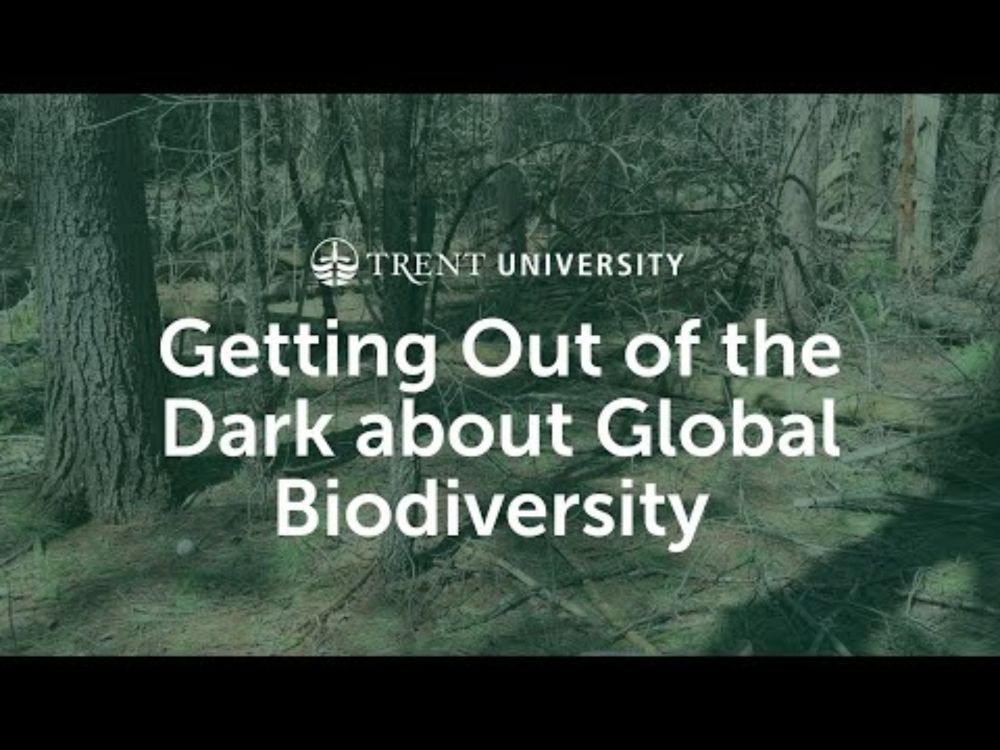Macroecology UT
@macroecologyut.bsky.social
Macroecology workgroup at the University of Tartu: Meelis Pärtel, Carlos Carmona and others
#Macroecology of #biodiversity #darkdiversity #DarkDivNet #TraitDivNet
https://macroecology.ut.ee/en/
#Macroecology of #biodiversity #darkdiversity #DarkDivNet #TraitDivNet
https://macroecology.ut.ee/en/
Happy to welcome three visitors this autumn! Elisa Jordan is a MSc student from Germany. Wengang Zhang is a PhD student from China working on #darkdiversity of #alienspecies. Gerard Martínez Devesa is a PhD student from Spain working on #darkdiversity of #arthropods in deadwood microhabitats.



October 23, 2025 at 7:37 AM
Happy to welcome three visitors this autumn! Elisa Jordan is a MSc student from Germany. Wengang Zhang is a PhD student from China working on #darkdiversity of #alienspecies. Gerard Martínez Devesa is a PhD student from Spain working on #darkdiversity of #arthropods in deadwood microhabitats.
Reposted by Macroecology UT
Although many ecosystems can weather several years of moderate drought, consecutive years of extreme dryness push them past a tipping point, resulting in dramatic declines in plant growth, researchers report in Science. https://scim.ag/4ogN9I8

Drought intensity and duration interact to magnify losses in primary productivity
As droughts become longer and more intense, impacts on terrestrial primary productivity are expected to increase progressively. Yet, some ecosystems appear to acclimate to multiyear drought, with cons...
scim.ag
October 21, 2025 at 7:17 PM
Although many ecosystems can weather several years of moderate drought, consecutive years of extreme dryness push them past a tipping point, resulting in dramatic declines in plant growth, researchers report in Science. https://scim.ag/4ogN9I8
Reposted by Macroecology UT
📢 68th #IAVS Symposium: Understanding #Ecosystems through #Vegetation | 22-26 June 2026, Spain
Join us to explore how vegetation shapes #biodiversity and ecosystems worldwide!
📅 Call for Special Session proposals is now open: 15 Oct – 15 Nov 2025
👉 Details: gijon2026.iavs-meetings.org
#IAVS2026
Join us to explore how vegetation shapes #biodiversity and ecosystems worldwide!
📅 Call for Special Session proposals is now open: 15 Oct – 15 Nov 2025
👉 Details: gijon2026.iavs-meetings.org
#IAVS2026

October 22, 2025 at 6:28 AM
📢 68th #IAVS Symposium: Understanding #Ecosystems through #Vegetation | 22-26 June 2026, Spain
Join us to explore how vegetation shapes #biodiversity and ecosystems worldwide!
📅 Call for Special Session proposals is now open: 15 Oct – 15 Nov 2025
👉 Details: gijon2026.iavs-meetings.org
#IAVS2026
Join us to explore how vegetation shapes #biodiversity and ecosystems worldwide!
📅 Call for Special Session proposals is now open: 15 Oct – 15 Nov 2025
👉 Details: gijon2026.iavs-meetings.org
#IAVS2026
Proud that our workgroup contributed to this study
The latest DroughtNet paper is out in Science today! Using coordinated experiments across six continents and 74 sites, the International Drought Experiment found differences between the effects of extreme droughts and more typical droughts... (1/3) www.science.org/doi/10.1126/...

Drought intensity and duration interact to magnify losses in primary productivity
As droughts become longer and more intense, impacts on terrestrial primary productivity are expected to increase progressively. Yet, some ecosystems appear to acclimate to multiyear drought, with cons...
www.science.org
October 17, 2025 at 7:23 AM
Proud that our workgroup contributed to this study
Reposted by Macroecology UT
Working with individual trait data and functional trait spaces and bored about means?
With @cpcarmona.bsky.social, Agnese Bissi and @etordoni.bsky.social, we put together a perspective to test the effect of individual observations on trait space properties 👇👇
www.nature.com/articles/s44...
With @cpcarmona.bsky.social, Agnese Bissi and @etordoni.bsky.social, we put together a perspective to test the effect of individual observations on trait space properties 👇👇
www.nature.com/articles/s44...

Quantifying the influence of intraspecific variability in trait spaces - npj Biodiversity
npj Biodiversity - Quantifying the influence of intraspecific variability in trait spaces
www.nature.com
October 1, 2025 at 10:51 AM
Working with individual trait data and functional trait spaces and bored about means?
With @cpcarmona.bsky.social, Agnese Bissi and @etordoni.bsky.social, we put together a perspective to test the effect of individual observations on trait space properties 👇👇
www.nature.com/articles/s44...
With @cpcarmona.bsky.social, Agnese Bissi and @etordoni.bsky.social, we put together a perspective to test the effect of individual observations on trait space properties 👇👇
www.nature.com/articles/s44...
Reposted by Macroecology UT
After six years, Aleš, Eva, and @mariekonecna.bsky.social resampled their #DarkDivNet core plots in Novohradské hory. Relevés in pairs of mesic meadows, beech forests, and waterlogged spruce forests were done.
July 24, 2025 at 7:28 AM
After six years, Aleš, Eva, and @mariekonecna.bsky.social resampled their #DarkDivNet core plots in Novohradské hory. Relevés in pairs of mesic meadows, beech forests, and waterlogged spruce forests were done.
Reposted by Macroecology UT
For sauropsids lovers: Two fresh papers map trait spaces of birds, turtles and crocodiles to reveal what disappears when species go extinct
www.nature.com/articles/s41...
onlinelibrary.wiley.com/doi/full/10....
🧪🌐🪶 🧮➕📏
#trait, #traits, #FunctionalTraits
www.nature.com/articles/s41...
onlinelibrary.wiley.com/doi/full/10....
🧪🌐🪶 🧮➕📏
#trait, #traits, #FunctionalTraits
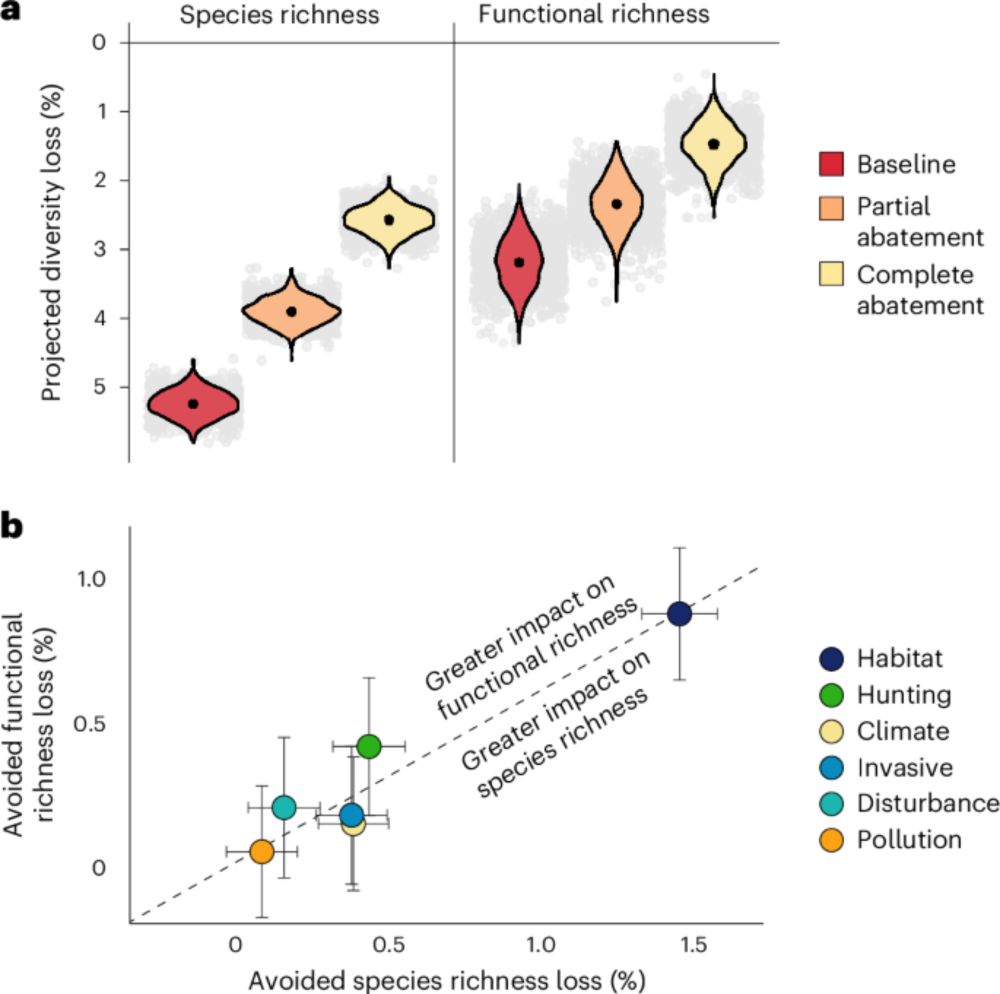
Threat reduction must be coupled with targeted recovery programmes to conserve global bird diversity - Nature Ecology & Evolution
Projections of extinctions of bird species and losses of functional diversity over the next 100 years suggest that even immediate and widespread threat abatement would be insufficient to prevent losse...
www.nature.com
June 25, 2025 at 4:36 AM
For sauropsids lovers: Two fresh papers map trait spaces of birds, turtles and crocodiles to reveal what disappears when species go extinct
www.nature.com/articles/s41...
onlinelibrary.wiley.com/doi/full/10....
🧪🌐🪶 🧮➕📏
#trait, #traits, #FunctionalTraits
www.nature.com/articles/s41...
onlinelibrary.wiley.com/doi/full/10....
🧪🌐🪶 🧮➕📏
#trait, #traits, #FunctionalTraits
Reposted by Macroecology UT
Even remote forests aren’t safe. New research shows human activity reduces biodiversity far beyond city limits. #BiodiversityLoss #DarkDiversity #ConservationScience
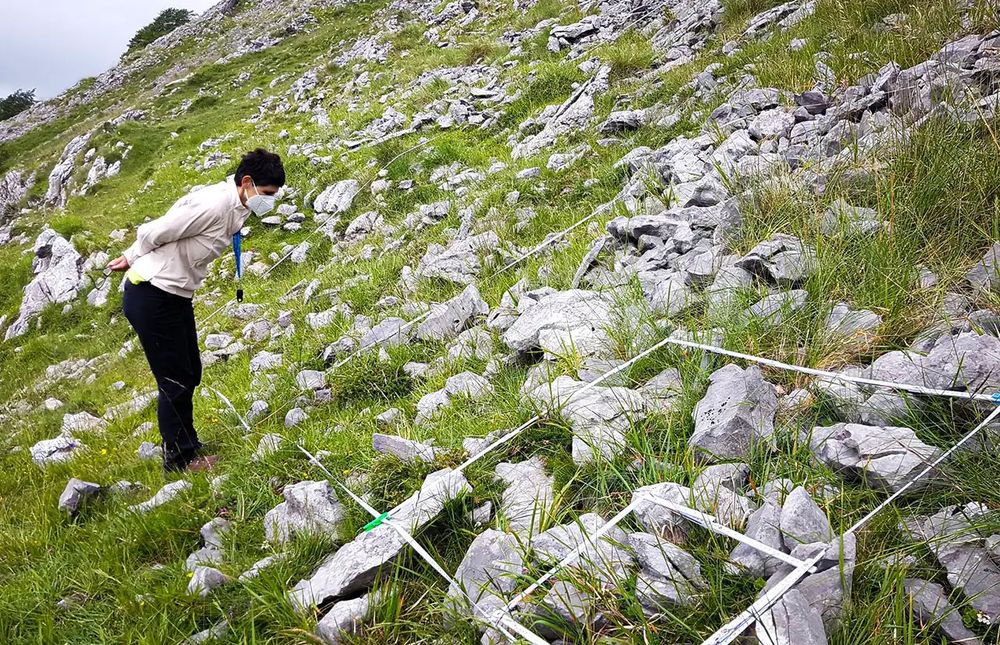
Invisible Loss: How Cities Empty Forests Afar
Even protected forests may be losing biodiversity due to human activity far away. A global study reveals the hidden erosion of nature’s potential.
geekoo.news
May 19, 2025 at 3:00 AM
Even remote forests aren’t safe. New research shows human activity reduces biodiversity far beyond city limits. #BiodiversityLoss #DarkDiversity #ConservationScience
Reposted by Macroecology UT
Quote: "The problem is that over time, as we lose species due to human impact, we don’t see the number of species that are lost because we only see what we can perceive." www.ualberta.ca/en/folio/202... #darkdiversity
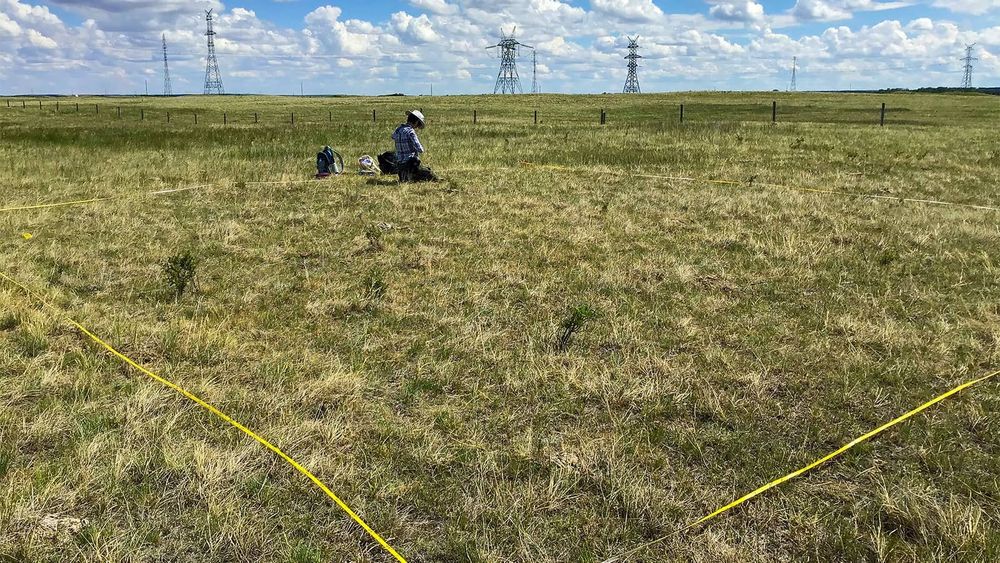
Uncovering ‘silent’ species losses key for conservation efforts: study
According to a recent study, accounting for dark diversity — the species that could be in a particular area but aren’t — could be the best way to identify and restore “silent losses” in plant diversit...
www.ualberta.ca
May 15, 2025 at 1:42 AM
Quote: "The problem is that over time, as we lose species due to human impact, we don’t see the number of species that are lost because we only see what we can perceive." www.ualberta.ca/en/folio/202... #darkdiversity
Reposted by Macroecology UT
Excited to share our new open-access review led by Francesco de Bello in Ecological Monographs! With a fantastic international team, we identify key challenges (“Raunkiæran shortfalls”) in trait-based ecology.
esajournals.onlinelibrary.wiley.com/doi/10.1002/...
#FunctionalTraits 🌐
esajournals.onlinelibrary.wiley.com/doi/10.1002/...
#FunctionalTraits 🌐
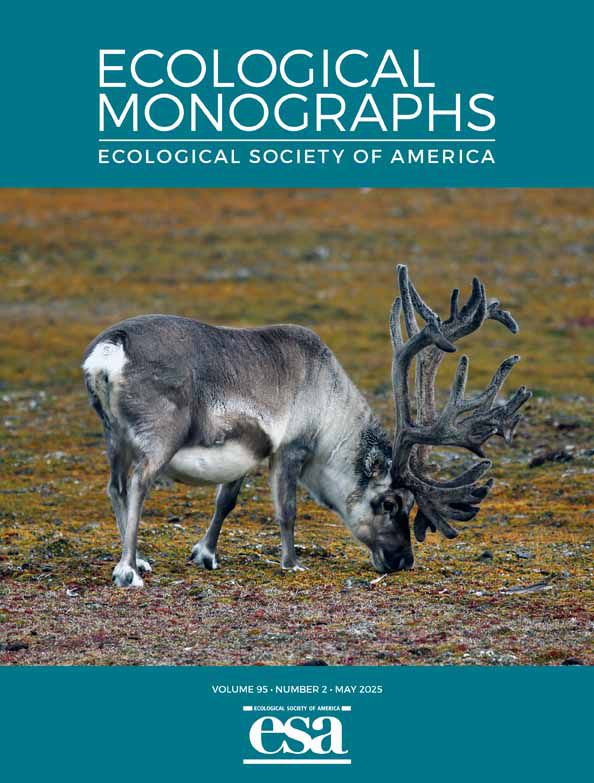
Raunkiæran shortfalls: Challenges and perspectives in trait‐based ecology
Trait-based ecology, a prominent research field identifying traits linked to the distribution and interactions of organisms and their impact on ecosystem functioning, has flourished in the last three...
esajournals.onlinelibrary.wiley.com
May 19, 2025 at 7:38 PM
Excited to share our new open-access review led by Francesco de Bello in Ecological Monographs! With a fantastic international team, we identify key challenges (“Raunkiæran shortfalls”) in trait-based ecology.
esajournals.onlinelibrary.wiley.com/doi/10.1002/...
#FunctionalTraits 🌐
esajournals.onlinelibrary.wiley.com/doi/10.1002/...
#FunctionalTraits 🌐
Norwegian Research Contributes to Global 'Dark Diversity' Study, Offering New Insights into Biodiversity Loss
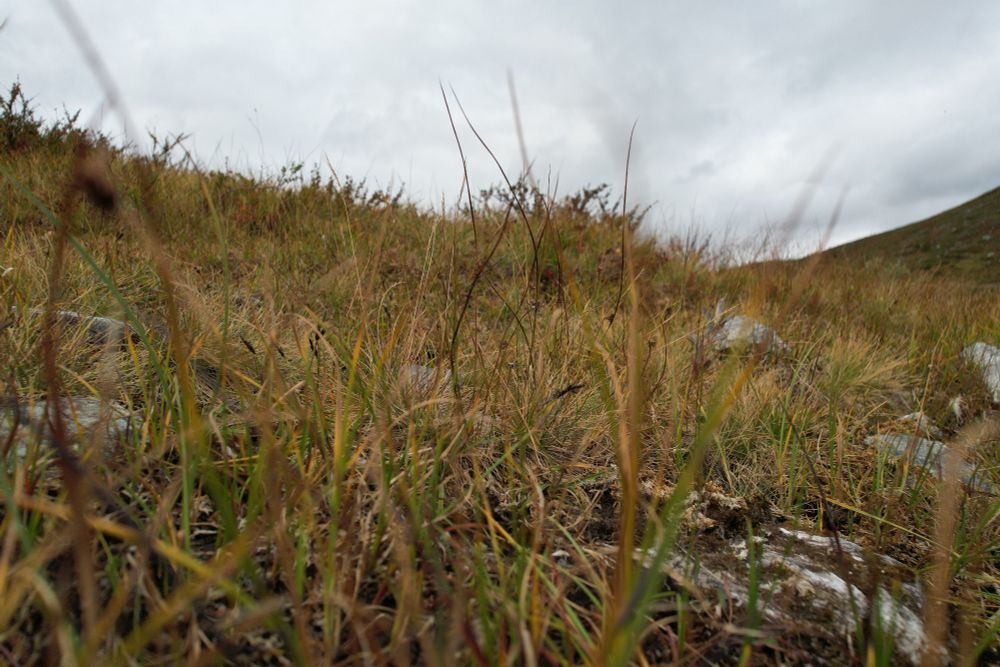
Norwegian Research Contributes to Global 'Dark Diversity' Study, Offering New Insights into Biodiversity Loss
Photo credit: Robert Lewis, NINA
Behind the study is a global research network of more than 200 researchers, called DarkDivNet, coordinated by the University of Tartu in Estonia, and advised by an i...
www.nina.no
April 28, 2025 at 2:08 PM
Norwegian Research Contributes to Global 'Dark Diversity' Study, Offering New Insights into Biodiversity Loss
Using dark diversity to disentangle the effects of protection and habitat quality on species diversity across the Mediterranean Sea
* A new paper in Biol Cons by Tal Gavriel, Jonathan Belmaker and others www.sciencedirect.com/science/arti...
* A new paper in Biol Cons by Tal Gavriel, Jonathan Belmaker and others www.sciencedirect.com/science/arti...
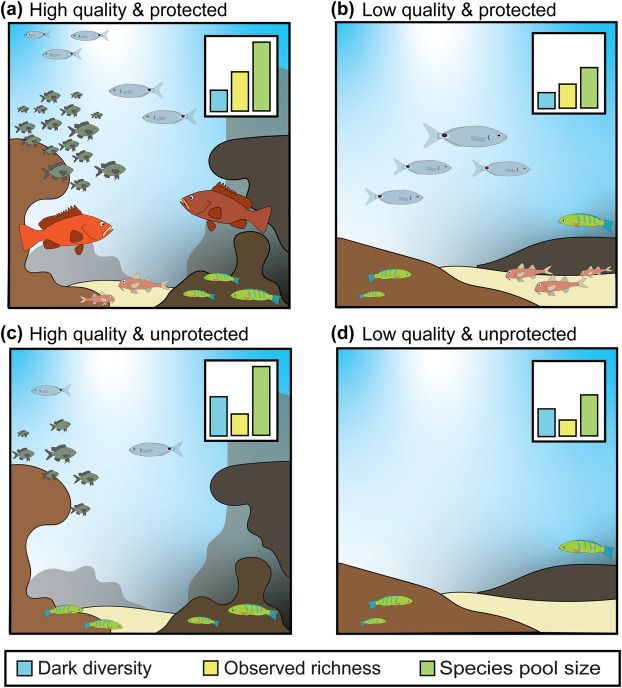
April 28, 2025 at 6:54 AM
Using dark diversity to disentangle the effects of protection and habitat quality on species diversity across the Mediterranean Sea
* A new paper in Biol Cons by Tal Gavriel, Jonathan Belmaker and others www.sciencedirect.com/science/arti...
* A new paper in Biol Cons by Tal Gavriel, Jonathan Belmaker and others www.sciencedirect.com/science/arti...
Reposted by Macroecology UT
April issue: Perspective led by Mari Moora describing how plant reliance on their mycorrhizal symbionts varies across ecological scales 🧪🌎
Web link: go.nature.com/4h1Rpre
Readcube: rdcu.be/eh0uC
Web link: go.nature.com/4h1Rpre
Readcube: rdcu.be/eh0uC
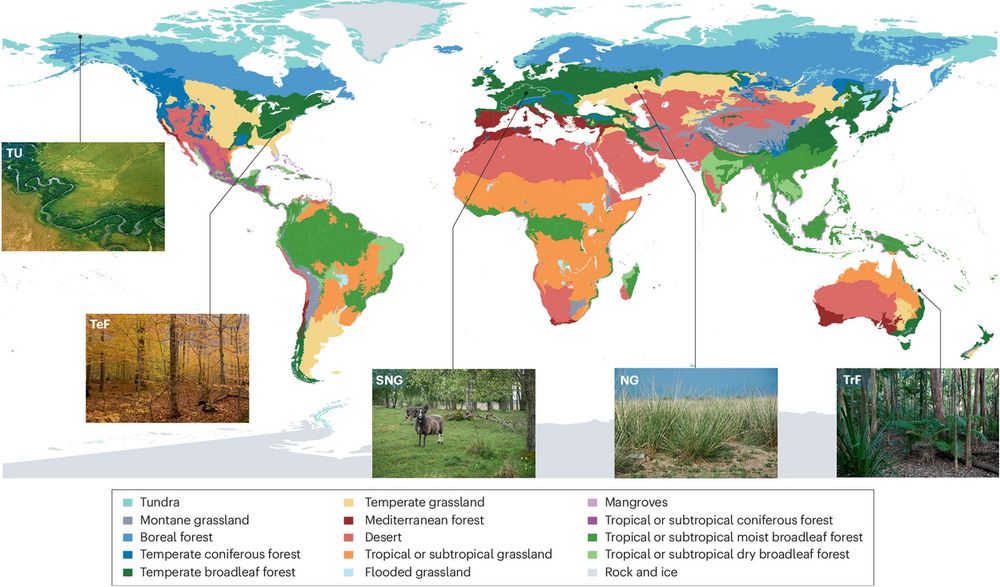
April 16, 2025 at 2:13 PM
April issue: Perspective led by Mari Moora describing how plant reliance on their mycorrhizal symbionts varies across ecological scales 🧪🌎
Web link: go.nature.com/4h1Rpre
Readcube: rdcu.be/eh0uC
Web link: go.nature.com/4h1Rpre
Readcube: rdcu.be/eh0uC
Norwegian Research Contributes to Global 'Dark Diversity' Study

Norwegian Research Contributes to Global 'Dark Diversity' Study, Offering New Insights into Biodiversity Loss
Photo credit: Robert Lewis, NINA
Behind the study is a global research network of more than 200 researchers, called DarkDivNet, coordinated by the University of Tartu in Estonia, and advised by an i...
www.nina.no
April 16, 2025 at 7:00 AM
Norwegian Research Contributes to Global 'Dark Diversity' Study
Reposted by Macroecology UT
New study in @nature.com: we focus on the diversity that's missing - “dark diversity.” Human impact means only 1 in 5 species persist in disturbed areas versus 1 in 3 in pristine ones. My summary of the project & its implications: the3dlab.org/2025/04/03/g...
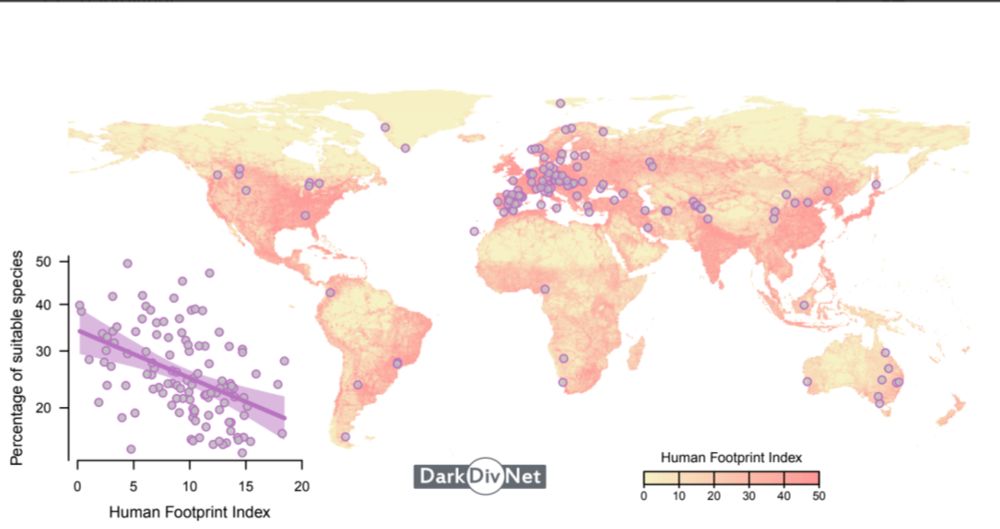
Global impoverishment of natural vegetation revealed by ‘dark diversity’
Back in 2019, we ventured into the field with a rather unusual mission: to search for the biodiversity that wasn’t there. At first glance, this might seem counterintuitive – after all, we’re …
the3dlab.org
April 3, 2025 at 12:30 PM
New study in @nature.com: we focus on the diversity that's missing - “dark diversity.” Human impact means only 1 in 5 species persist in disturbed areas versus 1 in 3 in pristine ones. My summary of the project & its implications: the3dlab.org/2025/04/03/g...
The Invisible Biodiversity Crisis
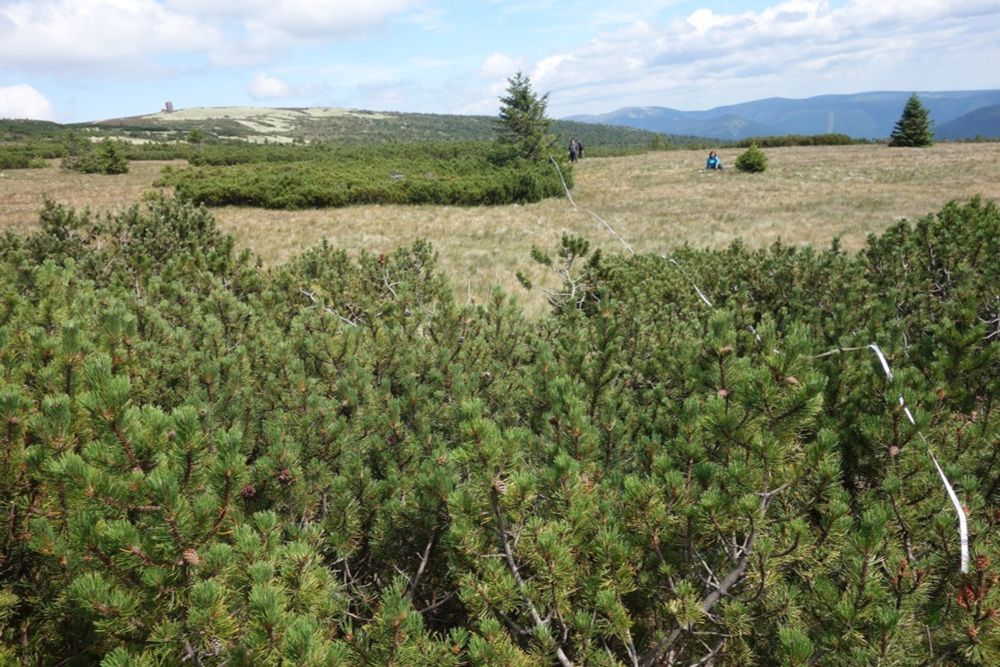
The Invisible Biodiversity Crisis: Global Study Reveals
Brno and Průhonice, 10. 04. 2025 – According to a new study by a team of more than 200 botanists from around the world, published in the prestigious journal Nature, the vegetation of natural areas is ...
www.sci.muni.cz
April 12, 2025 at 7:03 PM
The Invisible Biodiversity Crisis
Reposted by Macroecology UT
Super happy to be coauthor of this prestigious paper from #darkdivnet under the lead of Meelis Partel! Huge congrats to all coauthors.
The first paper from #darkdivnet is out now! Huge thank you to all our >200 co-authors who helped to reveal dark diversity in different parts of the world! www.nature.com/articles/s41...
April 7, 2025 at 7:33 AM
Super happy to be coauthor of this prestigious paper from #darkdivnet under the lead of Meelis Partel! Huge congrats to all coauthors.
Reposted by Macroecology UT
Important new study in @nature.com on how #darkdiversity can give insights on the diversity in local #plant communities that observed #diversity can't. With contributions from me, my two @au.dk colleagues @tokehoye.bsky.social & Signe Normand and many others. www.nature.com/articles/s41...
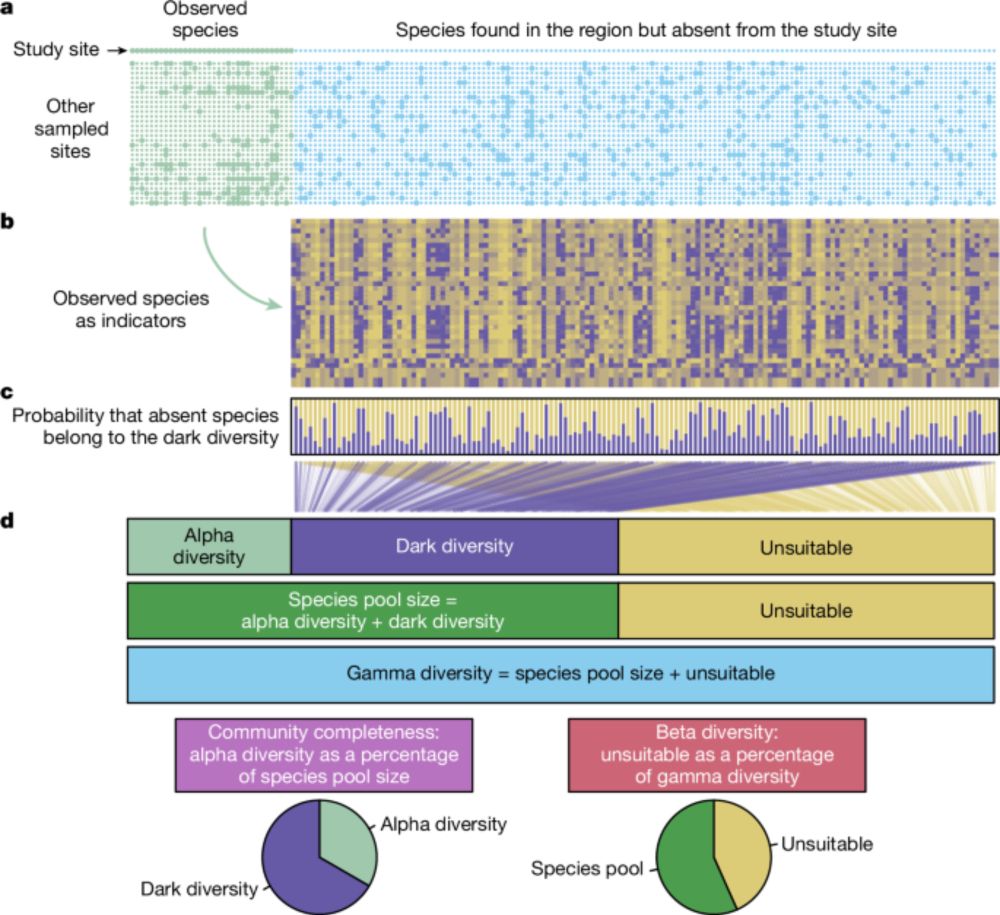
Global impoverishment of natural vegetation revealed by dark diversity - Nature
A comparison of alpha diversity (number of plant species) and dark diversity (species that are currently absent from a site despite being ecologically suitable) demonstrates the negative effects of re...
www.nature.com
April 4, 2025 at 8:22 AM
Important new study in @nature.com on how #darkdiversity can give insights on the diversity in local #plant communities that observed #diversity can't. With contributions from me, my two @au.dk colleagues @tokehoye.bsky.social & Signe Normand and many others. www.nature.com/articles/s41...
Reposted by Macroecology UT
Dark diversity made its way to Nature!🥳🥳
Led by Meelis Pärtel (@MacroecologyUT), we show that dark diversity - species locally absent but suitable - can reveal hidden effects of human impact on plant biodiversity, opening new pathways for conservation.
www.nature.com/articles/s41...
Led by Meelis Pärtel (@MacroecologyUT), we show that dark diversity - species locally absent but suitable - can reveal hidden effects of human impact on plant biodiversity, opening new pathways for conservation.
www.nature.com/articles/s41...
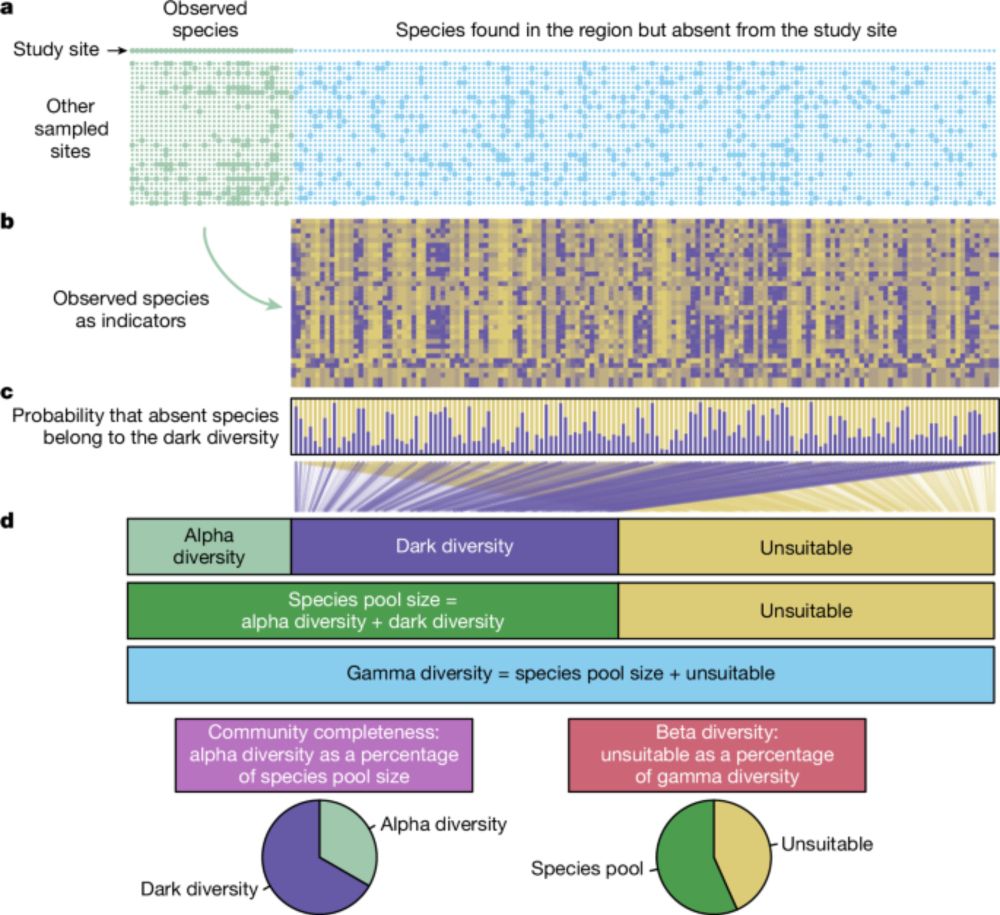
Global impoverishment of natural vegetation revealed by dark diversity - Nature
A comparison of alpha diversity (number of plant species) and dark diversity (species that are currently absent from a site despite being ecologically suitable) demonstrates the negative effects of re...
www.nature.com
April 4, 2025 at 12:15 PM
Dark diversity made its way to Nature!🥳🥳
Led by Meelis Pärtel (@MacroecologyUT), we show that dark diversity - species locally absent but suitable - can reveal hidden effects of human impact on plant biodiversity, opening new pathways for conservation.
www.nature.com/articles/s41...
Led by Meelis Pärtel (@MacroecologyUT), we show that dark diversity - species locally absent but suitable - can reveal hidden effects of human impact on plant biodiversity, opening new pathways for conservation.
www.nature.com/articles/s41...
Reposted by Macroecology UT
Excited to announce our new paper, “Global impoverishment of natural vegetation revealed by dark diversity,” out today in Nature – and it’s open access! Huge global collaboration led by Meelis Pärtel 🌐@macroecologyut.bsky.social
www.nature.com/articles/s41...
www.nature.com/articles/s41...
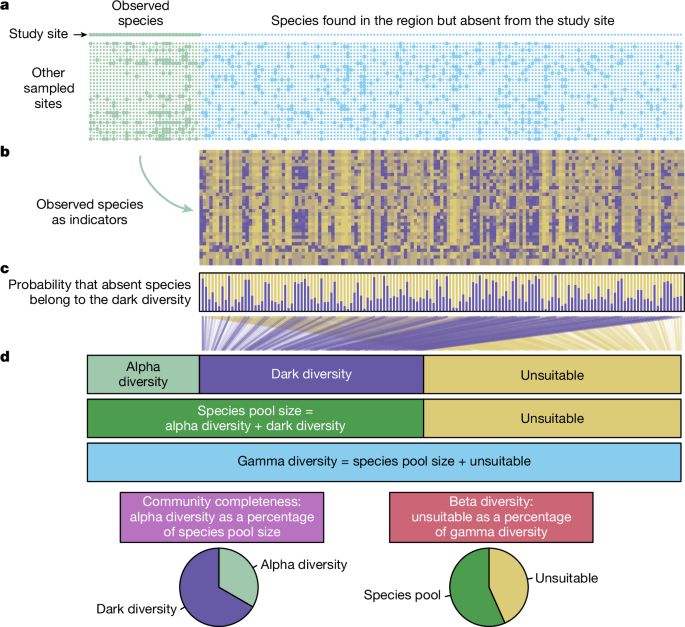
Global impoverishment of natural vegetation revealed by dark diversity - Nature
A comparison of alpha diversity (number of plant species) and dark diversity (species that are currently absent from a site despite being ecologically suitable) demonstrates the negative effects of re...
www.nature.com
April 2, 2025 at 7:31 PM
Excited to announce our new paper, “Global impoverishment of natural vegetation revealed by dark diversity,” out today in Nature – and it’s open access! Huge global collaboration led by Meelis Pärtel 🌐@macroecologyut.bsky.social
www.nature.com/articles/s41...
www.nature.com/articles/s41...
Reposted by Macroecology UT
Extremely excited to be part of this collaborative effort led by Meelis Pärtel and @macroecologyut.bsky.social
Excited to announce our new paper, “Global impoverishment of natural vegetation revealed by dark diversity,” out today in Nature – and it’s open access! Huge global collaboration led by Meelis Pärtel 🌐@macroecologyut.bsky.social
www.nature.com/articles/s41...
www.nature.com/articles/s41...

Global impoverishment of natural vegetation revealed by dark diversity - Nature
A comparison of alpha diversity (number of plant species) and dark diversity (species that are currently absent from a site despite being ecologically suitable) demonstrates the negative effects of re...
www.nature.com
April 3, 2025 at 4:57 AM
Extremely excited to be part of this collaborative effort led by Meelis Pärtel and @macroecologyut.bsky.social
Reposted by Macroecology UT
News article about our recent paper in Nature on global impoverishment of natural vegetation by Conny Sattler (cosattler.com) and myself in @theconversation.com @aunz.theconversation.com
theconversation.com/invisible-lo...
www.nature.com/articles/s41...
theconversation.com/invisible-lo...
www.nature.com/articles/s41...
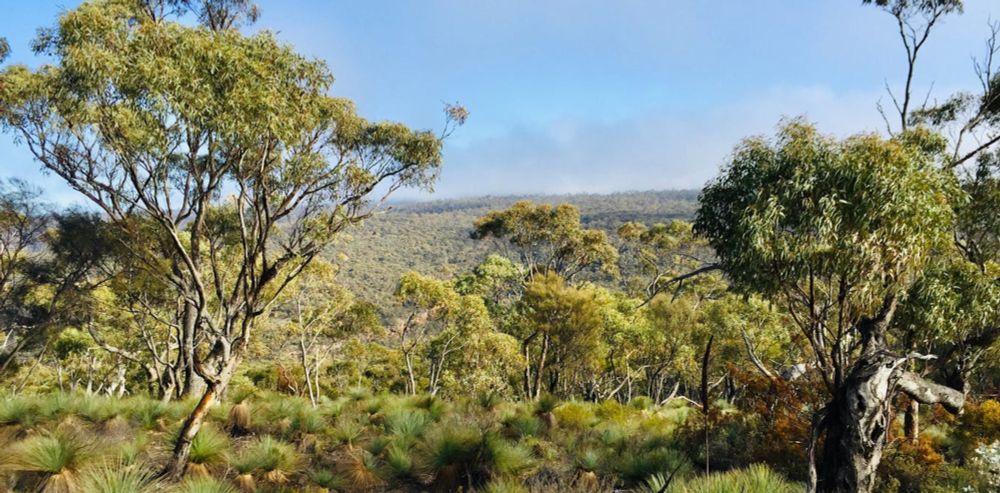
Invisible losses: thousands of plant species are missing from places they could thrive – and humans are the reason
Many native plants are missing from habitats where they should thrive – even in wilder areas. Why? Human actions such as logging, poaching and setting fires.
theconversation.com
April 2, 2025 at 9:58 PM
News article about our recent paper in Nature on global impoverishment of natural vegetation by Conny Sattler (cosattler.com) and myself in @theconversation.com @aunz.theconversation.com
theconversation.com/invisible-lo...
www.nature.com/articles/s41...
theconversation.com/invisible-lo...
www.nature.com/articles/s41...
Reposted by Macroecology UT
New @nature.com study: the negative effect of human activities on wildlife biodiversity may be notable hundreds of kilometres away ⚠️
For the study, @ufz.de's and iDiv's @lottekorell.bsky.social recorded plant species and so-called dark diversity in the Lüneburg Heath.
www.idiv.de/nature-study...
For the study, @ufz.de's and iDiv's @lottekorell.bsky.social recorded plant species and so-called dark diversity in the Lüneburg Heath.
www.idiv.de/nature-study...
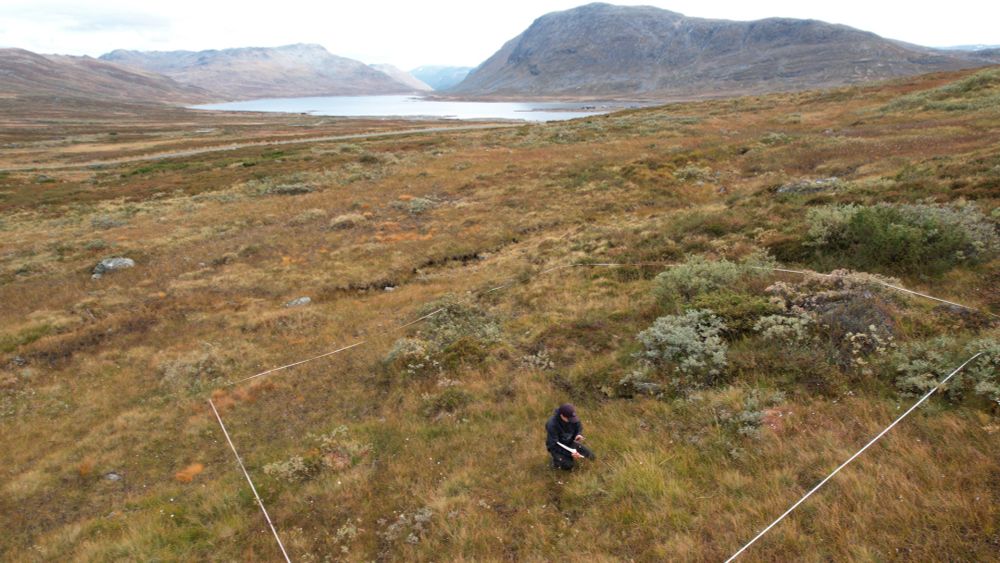
Dark diversity reveals global impoverishment of natural vegetation
Nature study shows that the potential occurrence of plant species is significantly higher
www.idiv.de
April 4, 2025 at 10:04 AM
New @nature.com study: the negative effect of human activities on wildlife biodiversity may be notable hundreds of kilometres away ⚠️
For the study, @ufz.de's and iDiv's @lottekorell.bsky.social recorded plant species and so-called dark diversity in the Lüneburg Heath.
www.idiv.de/nature-study...
For the study, @ufz.de's and iDiv's @lottekorell.bsky.social recorded plant species and so-called dark diversity in the Lüneburg Heath.
www.idiv.de/nature-study...


